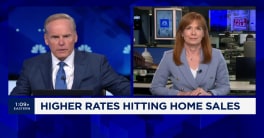It has been 19 months since the first alarm was raised about America�s two giant, federally chartered loan corporations. This past week the chickens started coming home to roost.
In February, 2003, the Federal Home Loan Mortgage Corporation, almost universally known as Freddie Mac, came under fire for illegal accounting practices. Specifically, Freddie was accused of using unlawful techniques to �smooth out� volatility in revenues and earnings, with an alleged primary aim of meeting goals that would generate bonuses for top senior management. These practices would also, presumably, encourage increases in the corporation�s stock value.
Then, on September 22, 2004, The Federal National Mortgage Corporation, usually called Fannie Mae, the larger of the two chartered entities, was accused of nearly identical �smoothing� practices.
Any discussion of accounting operations and abuses makes my eyes glaze over. Without talking about derivatives, which only three people in the whole world understand, here is a brief explanation of the issue. Freddie and Fannie were both putting some revenues and some anticipated and actual expenses into what the Chairman of the Office of Federal Housing Enterprise Oversight, which is involved in the investigation, called a �cookie jar.� Accountants could then dip into that jar and pull out appropriate amounts of income or expenses to insure the quarterly or yearly financial results desired by the corporations. Thus, if the corporations had sensational revenues or profits in 2004 and anticipated a more bleak 2005, they could hide part of the 2004 goodies in the cookie jar and later credit its contents to 2005, or even further down the line to ensure against radical gyrations in stock and, maybe, guarantee those executive bonuses.
Creative? Certainly!.
Legal? Certainly not!
Last December Freddie Mac paid $125 million in fines for its innovative accounting practices. It had already fired or retired three of its top executives and restated its 2000-2002 earnings upward by $5 billion while admitting it had also not reported a loss from a previous quarter. Who knows when you might need a little negative income?
Then, on October 4, 2004 it announced it was shutting down its Securities Sales and Trading Group, blamed for many of the accounting irregularities. The group�s market-making activities and operations involving investments and mortgages will be moved to other divisions of the corporation.
Since the charges against Fannie Mae were disclosed late last month, as might be expected, at least three class action lawsuits have been filed against the corporation by firms representing Fannie Mae�s investors. There will certainly be more of these to come.
On Wednesday, October 6, officers of Fannie Mae appeared before a subcommittee of the House Financial Services Committee. Chairman and CEO Franklin Raines and CFO Timothy Howard both testified that regulators� accusations of irregularities in accounting practices merely exemplified a difference in interpretation of �what are, admittedly, complex rules� Mr. Raines stated that he believed these rules had been applied (by Fannie Mae) in accordance with �generally accepted accounting practices.�
So, and we seem to be asking this question all too frequently, should anybody care?
Well Freddy and Fannie�s stockholders certainly should. Both stocks have been on a wild ride since February 2003. Stock in Freddie (FRE) has recovered much of its losses, standing at $67.00 on October 7. But Fannie�s stock (FNM) had a mid-day quote of $68.60 on October 7, well below its 52 week high of $80.82 on February 23.
But there are more global issues at play.
- The two corporations are privately owned by millions of investors and are both traded on the New York Stock Exchange (FNM and FRE). They are often described as 1,000 lb gorillas, and no wonder. Their market capitalization totals $111.4 billion. In February 2004, Federal Reserve Chairman Alan Greenspan told Congress that Freddie and Fannie, if allowed to grow unchecked, are likely to threaten the stability of the U.S. financial system.
- The two corporations stand behind some four trillion dollars in home mortgages, representing better than 75% of the single family mortgages in the country. Fannie Mae, on its own, is the second largest financial institution in the United States.
- Both corporations are currently the subject of investigations by the U. S. Department of Justice.
- The two, because they were originally chartered by the Federal Government, retain some unusual prerogatives. Both are allowed to borrow directly from the U.S. Treasury at lower rates than are generally available to other mortgage entities. These funds are used to purchase mortgages from banks, thrifts, and mortgage companies, thus funneling billions of dollars to facilitate home buying throughout the country. Many of these mortgages are then packaged into securities and resold to Wall Street investors.
�
�
�
In this way, the two operate exactly as they were designed to, making home ownership available to countless families previously unable to qualify for this privilege. One must, however, question how competition on a level field might further the end goal. And, continuing these unusual advantages, they are exempt from several Securities and Exchange Commission requirements when filing these securitized mortgage packages.
And, of course, politics always comes into play.
The two have many competitors who resent their special status and which have been actively lobbying Congress to reign in the two giants. And while F & F have supporters in Congress, many powerful Republicans are not among them. In particular, Rep Howard Baker, Chairman of the House panel hearing the testimony of Raines and Howard, is a longtime critic of both corporations.
They are also resented for their political clout. Raines is a former budget director in the Clinton administration. Other current and former officials include a member of the 9/11 Commission, the secretary of the Smithsonian Institution, an advisor to Vice President Walter Mondale, and a partner of President Bush when he owned the Texas Rangers.
So, might this imbroglio impact on the ability of millions of Americans to buy homes and place mortgages, as they have done for years, through Freddie and Fannie? Who knows? There will certainly be ramifications (Freddy has already been required to raise its minimum capital requirement by 30% until it gets its house in order), which could result in tighter control over the two corporations. While this �scandal� has been going on for over a year, with Congress, the Justice Department, and the SEC involved, the story is just beginning.
Stay tuned.







